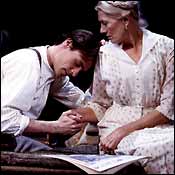
There can be little doubt that America’s favorite dramatic subject is the dysfunctional family. It stretches from The Glass Menagerie to The Skin of Our Teeth, from Death of a Salesman to The Fifth of July. Equally clearly, its grandest specimen is Long Day’s Journey Into Night, which rightly earns its frequent revivals, however few—if any—of them can do full justice to this long and devilishly demanding Eugene O’Neill masterpiece.
Broadway’s most recent tussles with it—the disastrous Jonathan Miller–directed and Jack Lemmon–starring abridgment in 1986 and the routine, lackluster version with Colleen Dewhurst and Jason Robards two years later—cried out for better to come. Yet is there a more unlikely family than beefy Brian Dennehy as James Tyrone, the aging matinee-idol father; British grande dame Vanessa Redgrave as the naïve, convent-bred Mary Tyrone; loutish Philip Seymour Hoffman as the handsome-wastrel elder son, Jamie; and the totally different—what family is he from?—Robert Sean Leonard as Edmund, the poetry-writing tubercular younger son, the author’s self-portrait?
Each of these parts is an actor’s plum, and even the peripheral Irish maid, Cathleen, is at least a raisin, which Fiana Toibin performs in the sensible traditional fashion. But that quartet of loving and resentful, wounding and forgiveness-begging infighters—sometimes funny, sometimes pathetic, and ultimately tragic—is now a car with unaligned wheels lurching ahead on a bumpy road.
Can you really see the colossal Dennehy, with his blunt-to-blustering overdrive, as a once-promising, lofty Shakespearean selling out into a dashingly swashbuckling Monte Cristo? In his final, drunken confession scene, he does score some points, but too few, too late. Sadly one recalls the first and finest James Tyrone, Fredric March, a magnificently poetic wreck of a man. Vanessa Redgrave’s Mary Tyrone is weird and fluttery, by turns childish and hysterical, untrustworthily unpredictable from the start. It is admittedly hard to convey the dichotomy of this lovable but ruinous character, best captured in my view by Martha Henry, Constance Cummings, and Geraldine Fitzgerald. The highly accomplished Redgrave gets some details right, but the overarching mental unstableness she exudes is so excessive as to make one wonder whether she is playing or being unhinged.
Robert Sean Leonard, genuine talent notwithstanding, has prematurely developed an RSL persona, or groove, into which he slips with disquieting predictability. As for Philip Seymour Hoffman, he comes nearest the mark, but Jason Robards, the original Jamie, set the standard here for a lyrically beautiful loser, for which this actor is physically unqualified.
Santo Loquasto, like others before him, has designed a faithful replica of the O’Neills’ New London shabby-genteel cottage, but this has the disadvantage of precluding a more exposed staircase allowing for Mary’s final, shattering descent. His costumes are suitable. Brian MacDevitt’s lighting is, as always, beyond reproach. Robert Falls has directed effectively until the end; with Mary flouncing in from the rear and fluttering all over the place, the conclusion is even flatter than the absence of that symbolic descent would predicate. Still, the grandeur of O’Neill’s achievement is hard to expunge, and not a little of it survives, however hampered, here.
Why aren’t the two one-acters Woody Allen has written and directed under the title Writer’s Block more satisfying than they are? Allen may be less funny in the theater than at the movies, but still, why? Perhaps because drama is, after all, a more disciplined, structure-driven, fastidious medium than film, where everything is possible. Even when a play is fantastic or absurd, it wants to have a soupçon of credibility to go with the three-dimensional flesh-and-blood actors.
Riverside Drive is about Jim, a married screenwriter, waiting on a Riverside Park bench for Barbara, a young woman with whom he is having an affair. A very peculiar, literate yet threatening bagman, Fred, accosts him. He has been unnoticedly shadowing Jim and, quite improbably, knows all about Jim’s life, down to the last intimate detail. He asserts that Jim’s recent successful movie is really his, Fred’s, life story, overheard and cribbed by Jim. He thus claims to be Jim’s co-writer, and demands equal credit and remuneration for this and all future movies. To be sure, he is nuts, and receives radio messages from Them on the Empire State Building directly into his brain. He terrorizes Jim, and when the unreliable Barbara eventually arrives and Jim tries to break off with her, things become even hairier.
The funny lines are there, all right, and park-bench comedies (e.g., I’m Not Rappaport) have a certain claim on the preposterous, but whereas Jim and Barbara stay within the limits of acceptable foibles, Fred is too obviously contrived, his lunacy too theatrical for its own good. Skipp Sudduth and Paul Reiser are excellent—Kate Blumberg’s Barbara is standard-issue—but I miss the basis in truth with which I could connect.
Old Saybrook is even more cut-off. I mustn’t give away too much, but the reverse Pirandellism—an author in search of six characters—doesn’t click. The imaginary in Pirandello is humanized; in Allen, it is merely farcicalized, and remains unsymbolic, uningratiating, uninvolving. Again, there are good gags galore, but they float in an affectless limbo. Even such fine actors as Bebe Neuwirth and Jay Thomas have the small rug of reality pulled out from under them; only Christopher Evan Welch, either because his part is best or because he is a hellishly funny guy, comes over full-fledged.
Mention must also be made of Santo Loquasto’s two terrific sets, almost good enough to fill in the gaps in Allen’s dramaturgy. Woody’s stage-directorial debut, however, is effective in almost all respects—except perhaps choice of plays.
Theater Listings
• Openings and Closings
• Broadway Shows
• Off-Broadway Shows
• Off-Off-Broadway
Long Day’s Journey Into Night
Revival of the Eugene O’Neill play, staged by Robert Falls; starring Vanessa Redgrave, Brian Dennehy, Philip Seymour Hoffman, and Robert Sean Leonard.
Writer’s Block
Two one-act comedies written and staged by Woody Allen.